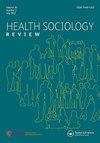使抑郁症合法化:社区观点和寻求帮助的连续体
IF 2.5
2区 医学
Q2 HEALTH POLICY & SERVICES
引用次数: 0
摘要
摘要:本文采用一个合法性框架来探讨生活在澳大利亚墨尔本的英澳裔和印澳裔社区成员如何理解抑郁症的诊断和治疗。研究社区对抑郁症的看法,揭示了抑郁症患者在向他人透露自己的经历时所遇到的非专业话语。基于10个焦点小组,77名来自印澳和英澳背景的社区成员,我们部署了描述抑郁症的三个合法性框架:生物医学、情境和道德。印度裔澳大利亚人的参与者不太可能将抑郁症视为一种合理的生物医学疾病,他们主要用与移民经历有关的情境术语来描述抑郁症。此外,印度裔澳大利亚人经常将屈服于抑郁症描述为个人弱点的标志,这表明在他们的社区中披露抑郁症可能会失去道德合法性。英裔澳大利亚人更容易承认抑郁症在生物医学上的合法性,但对医学诊断和抗抑郁药治疗提出了非专业批评。在长期抑郁的情况下,在两个群体中都有可能失去道德合法性。研究结果表明,在两个社区中,抑郁症及其治疗在社会合法化的方式和程度上存在差异,这体现在寻求帮助的不同方法上。本文章由计算机程序翻译,如有差异,请以英文原文为准。
Legitimising depression: community perspectives and the help-seeking continuum
ABSTRACT This article deploys a legitimacy framework to explore how Anglo-Australian and Indian-Australian community members living in Melbourne, Australia, interpret the diagnosis and treatment of depression. Examining community beliefs about depression illuminates the lay-discourses that people living with depression encounter when they disclose their experiences to others. Based on 10 focus groups with 77 community members from Indian-Australian and Anglo-Australian backgrounds, we deploy three frames of legitimacy through which depression is described: biomedical, situational, and moral. Indian-Australian participants were less likely to see depression as a legitimate biomedical condition, describing it primarily in situational terms often connected to migration experiences. Additionally, Indian-Australians often described succumbing to depression as a sign of individual weakness, suggesting that disclosing depression within their community risks loss of moral legitimacy. Anglo-Australians more readily recognised the biomedical legitimacy of depression but offered lay-critiques of medical diagnoses and treatment with antidepressants. In cases of long-term depression, there was a potential loss of moral legitimacy within both communities. The findings illustrate variation in the ways and degrees to which depression and its treatment are socially legitimised across two communities, which manifests in a continuum of diverse approaches to help-seeking.
求助全文
通过发布文献求助,成功后即可免费获取论文全文。
去求助
来源期刊

Health Sociology Review
Multiple-
CiteScore
7.50
自引率
0.00%
发文量
14
期刊介绍:
An international, scholarly peer-reviewed journal, Health Sociology Review explores the contribution of sociology and sociological research methods to understanding health and illness; to health policy, promotion and practice; and to equity, social justice, social policy and social work. Health Sociology Review is published in association with The Australian Sociological Association (TASA) under the editorship of Eileen Willis. Health Sociology Review publishes original theoretical and research articles, literature reviews, special issues, symposia, commentaries and book reviews.
 求助内容:
求助内容: 应助结果提醒方式:
应助结果提醒方式:


